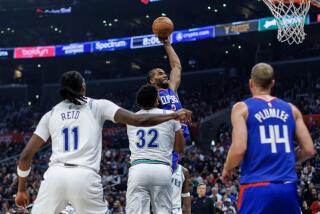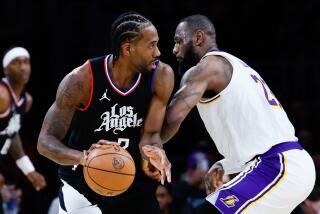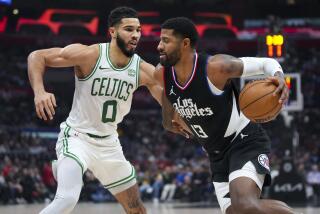Clippers Get Gravity of Situation
You knew the Clippers were going to be all right when Utahâs Karl Malone tossed up a free throw--and it didnât go anywhere. I mean, it just hung on the rim like a putt hanging on the lip of a cup. It didnât fall to the ground. And it wouldnât go into the hoop.
Malone just stood there, like a guy who hears a cough coming out of a coffin. He didnât know whether to laugh or call 911.
The situation was this: It was the fourth quarter. Utah, which had been down by 19 only two minutes earlier, had closed the gap to nine. There were four minutes to play, and one of the Clippersâ key players, Charles Smith, had just fouled out.
Malone put up the shot. It simply sat between the glass and the rim, defying gravity.
It sent a message to Utah: Forget about it. Not tonight, guys.
It has been that kind of a year for the Clippers, L.A.âs orphans. The team the town found on its doorstep eight years ago with a note pinned to it, the team that once won only 12 games all season and had about the credibility of a guy selling vegetable peelers on street corners, was almost at the glass slipper stage.
It has been a team of overachievers. It doesnât overwhelm anybody. Itâs like a baseball team that bunts and runs, a fighter who jabs and holds. There are no superstars on the Clippers, just solid players who must play as a team or lose.
The Clippers have had coaches who didnât have a clue what to do with this cast of supporting players, but now they have Larry Brown and the league finds them pesky and irritating--and free throws stay on the rim defying gravity.
They came into a town that had Magic and Kareem--and Jerry and Elgin and Wilt--and it was like being in a car with Dolly Parton. Nobody noticed them. They were stepchildren. The Lakers manhandled them six times a year with contemptuous ease. But then, so did everybody.
The nearest thing they had to a superstar was a 6-foot-10, 235-pound forward who had been All-Everything in college and was the No. 1 draft choice in 1988 and was expected to make the town forget James Worthy as soon as he learned the pro moves.
No one ever called him âAirâ Manning, or âThe Mailmanâ or âThe Iceman,â but Danny Manning could answer to the nickname âSlick.â Or even âSilk.â When he has the basketball, the other team gets back in a hurry. His play on the floor looks innocent, but, just when you think heâs going to dish off, he swoops to the basket.
Manning is not what youâd call a âdeep threat.â He has exactly one three-point basket in his regular-season career. But his 19.3-point average tops the Clippers. He has more points and more rebounds than anyone on the club, and he does it all with a right knee thatâs as unpredictable as Texas weather. He usually plays with it wrapped like a Christmas turkey.
Manning sort of typifies the Clippers, a team of artisans, not artists. They play a workmanlike game, hard-hat basketball. They have to minimize mistakes, but when a brilliant performance is called for, they get the ball to Manning. Danny seldom disappoints. There was a period of time when his knee was flaring up that the Clippers were weighing trade offers. But the league responded with such alacrity, his own management was scared off. The Clippers realized what a mistake they would be making.
Playing in a playoff is such a new experience for the Clippers--Gerald Ford was President and the team was in Buffalo the last time they made it--that they had no idea how to go about it. A playoff game is unlike the regular season. The officials tend to overlook anything short of murder one on the floor.
The Utah Jazz knew this in Games 1 and 2. The Clippers found out the hard way. They learned that a trip to the basket in a playoff game can be like a walk through Central Park with your Rolex showing.
In Game 3, the Clippers brought their brass knuckles. They even fight as a team. They dominated the Jazz and then, when Mailman Maloneâs letter failed to drop, they knew fate was on their side.
I donât know what âhome-court advantageâ is. I know what it used to be. In the early struggling days of the league, it used to be simply that the referees became âhomers.â Or got fired by irate owners. The NBA is beyond that stage today.
Danny Manning says he knows what it is. âYou get back in the familiar, the comfortable. You eat at home, you sleep at home, youâre in a family environment. Youâre relaxed. Then, you feed off the emotion of the fans, your confidence goes up, and the other team has to resist intimidation, hostility.â
Maybe. But, maybe, too, itâs the ball telling you something when it just sits there on the rim and mocks you and gravity just when youâve got a rally going.
More to Read
Get our high school sports newsletter
Prep Rally is devoted to the SoCal high school sports experience, bringing you scores, stories and a behind-the-scenes look at what makes prep sports so popular.
You may occasionally receive promotional content from the Los Angeles Times.






